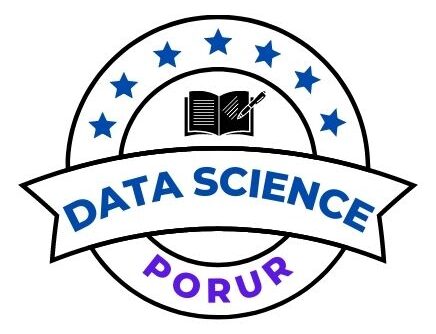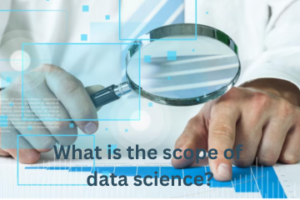- Introduction
Data science has become a progressively important field for enterprises, governments, and organizations of all types in recent years. Large volumes of data must now be gathered, analyzed, and interpreted in order to make educated decisions, enhance workflows, and spur innovation.
An unrivaled rate of growth is being experienced in the amount of data produced daily. From social media and e-commerce websites to connected devices and the Internet of Things (IoT), various sources are producing this data. Making sense of this data and transforming it into insights that can be used requires data science.
Don’t delay your career growth, kickstart your career by enrolling in this data science classes in Bangalore.
Learn the core concepts of Data Science Course video on Youtube:
Decisions cannot be made in the context of modern business by using emotion. Instead, organizations must increasingly make data-based decisions to remain competitive and achieve their business objectives. Data science offers the methods and tools required to interpret the data and produce insights that can guide judgment.
Machine learning (ML) and artificial intelligence (AI) are altering how businesses run. These technologies need a lot of data to build models and forecast outcomes. These technologies’ cornerstone is data science, which enables companies to use AI and ML to their advantage and achieve an edge in the market.
Kick start your career data science course in Chennai.
- The Role of Programming Language in Data Science
For data scientists, programming languages is necessary because they allow them to analyze and alter data, create models, and produce visualizations. The following are some important functions that programming languages do in data science:
- Data manipulation and cleaning: Cleaning and preparing the data for analysis is the initial stage in any data science endeavor. This entails activities including eliminating duplicates, dealing with missing information, and formatting the data in a way that makes it appropriate for analysis. Libraries and tools for carrying out these activities are provided by programming languages like Python, R, and SQL.
- Data analysis and modeling: After the data has been prepared and cleansed, the next stage is to analyze it and create models to draw conclusions. Powerful libraries and tools, including machine learning algorithms and statistical analysis tools, are available for data analysis and modeling in programming languages like Python and R.
- Data visualization: Data visualization is crucial to data science because it makes insights and conclusions more understandable to stakeholders. Charts, graphs, and interactive dashboards can be created using libraries for programming languages like Python and R.
- Deployment and product ionization: Once a model has been developed, it must be used to make predictions about new data. For deploying models, such as Flask and Django, programming languages like Python offer tools and frameworks.
Data science depends heavily on programming languages since they offer the tools and libraries required for data cleansing and manipulation, analysis and modeling, visualization, and deployment. The precise requirements of the project and the data science team’s competence determine the programming language to use.
Are you looking to become a data scientist? Enrol in the data science training institute in Hyderabad with job guarantee.
- Popular programming language for Data Science
The three most widely used programming languages in data science are described below:
Python
Python has established itself as a mainstay in the data science field. It is a well-liked general-purpose programming language. Python is known for being simple to read, flexible, and easy to use. NumPy, Pandas, Matplotlib, and Scikit-learn are just a few of the many libraries and tools available in Python that are intended expressly for data research. Tasks, including data cleansing and processing, statistical analysis, and machine learning, are supported by these tools.
R
The computer language R was created especially for statistical computing and graphics. Due to its strong statistical analytic capabilities and extensive library of packages for data analysis and visualization, it has grown to be a favorite among data scientists. For activities like exploratory data analysis, statistical modeling, and data visualization, R is beneficial.
SQL
Relational database management is done using the domain-specific language SQL (Structured Query Language). It is constructive for activities like data aggregation, data aggregation, and data querying. Data warehousing, business intelligence, and data science all make considerable use of SQL for operations like cleaning and preparing data.
The most widely used programming languages for data science are Python and R because they offer a large selection of libraries and tools made expressly for data analysis and modeling. Additionally, SQL is crucial for data science, especially when working with massive datasets housed in relational databases and performing data preparation and cleaning operations. The precise objectives of the project and the data science team’s competence ultimately determine the programming language to use.
Kickstart your career by enrolling in this data science course in Pune.
- Choosing the Right Language for Data Science Needs
The best programming language to use for your data science needs is a crucial decision that will be influenced by a variety of elements. When selecting a language, bear in mind the following essential factors:
- Project requirements: The project should be the first factor taken into account while selecting a programming language. This takes into account elements, including the kind and volume of data being analyzed, the modeling strategies being employed, and the preferred output format.
- The skills of your data team: Your data team’s competence is a crucial factor. It might be more effective to employ that language for your data science initiatives if your staff is already fluent in it. On the other hand, if your team is new in this data science world then choosing a language that is simpler to understand and use may be more advantageous.
- Integration with current systems: Lastly, it’s critical to take into account how well the language connects with current technology. Compatibility with current databases, data pipelines, and other software tools are a few examples of these factors.
- Community support: Community support is another crucial factor to take into account when selecting a programming language. A vibrant community can offer beneficial tools like documentation, guides, and libraries to hasten development and troubleshooting.
For your data science needs, selecting the best programming language necessitates careful consideration of a number of criteria. You can select a language that will enable you to effectively and efficiently analyze your data and extract insightful conclusions by taking into account project needs, data team expertise, community support, and system integration.
Data Science Placement Success Story
Conclusion
The question of what programming language is required for data science cannot be answered in a generalized way. The decision of selecting a programming language is done by many elements, such as the needs of the project, the team’s skills, community support, and system integration. Although common alternatives for data science include Python, R, and SQL, many other languages can also be helpful, depending on the project and team’s needs.
The capacity to use a language to clean, analyze, and visualize data successfully is the key to successful data science, not the language that is used. Therefore, to gain insights and make decisions from data, it is imperative to have a good understanding of data science principles and programming language skills.
The most crucial element is to pick a language that suits the unique demands of the task and team and to keep learning and developing as the field develops, even though there is no one correct answer to the question of which programming language is required for data science.
Data Science Training Institutes in Other Locations
Tirunelveli, Kothrud, Ahmedabad, Hebbal, Chengalpattu, Borivali, Udaipur, Trichur, Tiruchchirappalli, Srinagar, Ludhiana, Shimoga, Shimla, Siliguri, Rourkela, Roorkee, Pondicherry, Rajkot, Ranchi, Rohtak, Pimpri, Moradabad, Mohali, Meerut, Madurai, Kolhapur, Khammam, Jodhpur, Jamshedpur, Jammu, Jalandhar, Jabalpur, Gandhinagar, Ghaziabad, Gorakhpur, Gwalior, Ernakulam, Erode, Durgapur, Dombivli, Dehradun, Cochin, Bhubaneswar, Bhopal, Anantapur, Anand, Amritsar, Agra , Kharadi, Calicut, Yelahanka, Salem, Thane, Andhra Pradesh, Greater Warangal, Kompally, Mumbai, Anna Nagar, ECIL, Guduvanchery, Kalaburagi, Porur, Chromepet, Kochi, Kolkata, Indore, Navi Mumbai, Raipur, Coimbatore, Bhilai, Dilsukhnagar, Thoraipakkam, Uppal, Vijayawada, Vizag, Gurgaon, Bangalore, Surat, Kanpur, Chennai, Aurangabad, Hoodi,Noida, Trichy, Mangalore, Mysore, Delhi NCR, Chandigarh, Guwahati, Guntur, Varanasi, Faridabad, Thiruvananthapuram, Nashik, Patna, Lucknow, Nagpur, Vadodara, Jaipur, Hyderabad, Pune, Kalyan.
Data Analyst Courses In Other Locations
Tirunelveli, Kothrud, Ahmedabad, Chengalpattu, Borivali, Udaipur, Trichur, Tiruchchirappalli, Srinagar, Ludhiana, Shimoga, Shimla, Siliguri, Rourkela, Roorkee, Pondicherry, Rohtak, Ranchi, Rajkot, Pimpri, Moradabad, Mohali, Meerut, Madurai, Kolhapur, Khammam, Jodhpur, Jamshedpur, Jammu, Jalandhar, Jabalpur, Gwalior, Gorakhpur, Ghaziabad, Gandhinagar, Erode, Ernakulam, Durgapur, Dombivli, Dehradun, Bhubaneswar, Cochin, Bhopal, Anantapur, Anand, Amritsar, Agra, Kharadi, Calicut, Yelahanka, Salem, Thane, Andhra Pradesh, Warangal, Kompally, Mumbai, Anna Nagar, Dilsukhnagar, ECIL, Chromepet, Thoraipakkam, Uppal, Bhilai, Guduvanchery, Indore, Kalaburagi, Kochi, Navi Mumbai, Porur, Raipur, Vijayawada, Vizag, Surat, Kanpur, Aurangabad, Trichy, Mangalore, Mysore, Chandigarh, Guwahati, Guntur, Varanasi, Faridabad, Thiruvananthapuram, Nashik, Patna, Lucknow, Nagpur, Vadodara, Jaipur, Hyderabad, Pune, Kalyan, Delhi, Kolkata, Noida, Chennai, Bangalore, Gurgaon, Coimbatore.
Navigate To:
360DigiTMG – Data Analytics, Data Science Course Training in Chennai
D.No: C1, No.3, 3rd Floor, State Highway 49A, 330, Rajiv Gandhi Salai, NJK Avenue, Thoraipakkam, Chennai – 600097
Phone: 1800-212-654321
Email: enquiry@360digitmg.com
Get Direction: best data science training in chennai
Source Link: What are the Best IT Companies in Thoraipakkam
Here are some resources to check out: How to Get a Data Science Job as a Fresher




